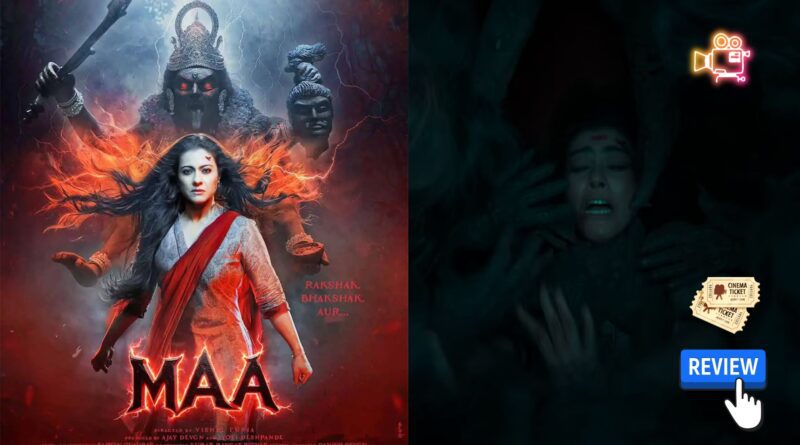Maa Movie Review: Kajol’s Roar is a Primal Force of Nature in This Uneven Tale
In the grand theatre of life, there are few stories as old as a mother’s love. We’ve seen it whispered, sung, and celebrated. But rarely have we seen it weaponized into a storm of such primal fury as in “Maa.” After weeks of hushed, reverent whispers in the critic circles, I can say this: Kajol has not just returned to the screen; she has erupted onto it, and the tremors will be felt for a long time.

The film, at its heart, is a deceptively simple tale. We are introduced to Anjali (Kajol), a single mother living a quiet, unassuming life in the dusty, claustrophobic lanes of a small North Indian town. Her world is her daughter. But when she is ensnared by the town’s corrupt political machinery, Anjali’s gentle world shatters. “Maa” is the story of her transformation from a simple mother into a force of nature, a lioness who will burn the entire forest down to save her cub. Expect not a tear-jerking drama, but a raw, emotional thriller that grips you and rarely lets go.
The soul, the fire, and the very bedrock of “Maa” is Kajol. Let me be clear: this is a career-defining performance. She uses silence as a weapon and her world-famous expressive eyes as a canvas for arias of pain, rage, and unwavering determination. In one scene, where she wordlessly confronts the antagonist for the first time, Kajol delivers a masterclass, communicating a threat so potent that the air in the cinema crackles. The direction and cinematography are her loyal allies, capturing the grit and grime of a system collapsing under one woman’s will. The camera often stays tight on her face, making you a part of her every defiant thought.
Yet, even the most incandescent star can be dimmed by a faltering sky. The film’s primary disappointment lies in its screenplay, which, after a taut and unpredictable first half, stumbles into the familiar territory of revenge dramas. A few key supporting characters feel more like plot devices than people, their motivations left frustratingly unexplored. The background score, while powerful, sometimes swells to dictate the emotion rather than subtly enhancing Kajol’s masterful work, a common flaw in modern thrillers.
So, Should You Watch “Maa”?
The answer is an unequivocal yes. You do not watch “Maa” for a groundbreaking plot; you watch it to witness an actor at the absolute zenith of her powers. You watch it for the sheer, electrifying force of Kajol’s performance that elevates the film from a standard thriller to an unforgettable cinematic event. She is the reason to book the ticket, the reason you will talk about the film, and the reason it will stay with you.
Disclaimer: After two decades spent in the glow of the silver screen, this is my analysis. The true power of a film is a personal dialogue between the screen and the viewer. Go, let Anjali’s story unfold before you, and decide for yourself if this mother’s roar resonates within you.



